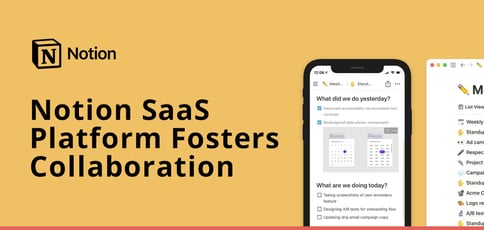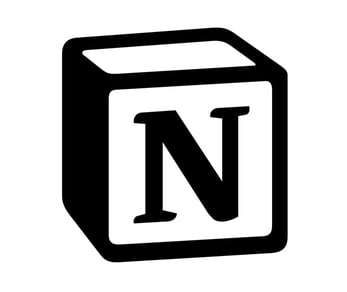
TL; DR: The Notion SaaS platform is an all-in-one collaboration and knowledge-sharing workspace that combines docs, notes, and project management tools for more inclusive workflows. Notion offers support that integrates databases, tasks, and wikis, and users can comment on ongoing projects, participate in discussions, and receive feedback. In addition to cross-platform apps, users can access Notion via most web browsers. Today, the platform has a user base of around 20 million and continues to expand its worldwide presence.
The COVID-19 pandemic gave online collaboration and productivity tools a massive boost that has resulted in a 44% increase in uptake since Q2 of 2020, according to a recent study by Gartner. Nearly 80% of workers polled said they used collaboration tools for work in 2021, up from just above 50% of workers in 2019, according to its Digital Worker Experience Survey.
“As many organizations shift to a long-term hybrid workforce model, cloud-based personal and team productivity technologies and collaboration tools will form the core of a series of new work hubs that meet the requirements of various remote and hybrid workers,” read the report.
That accelerated uptake presents a significant opportunity for providers of collaboration software — both established players and new arrivals. It’s rapidly turned into a crowded market that brings extra pressure to differentiate collaboration platforms.

The Notion SaaS platform is a collaboration suite that has distinguished itself in a competitive market. The platform offers an all-in-one knowledge-sharing hosted workspace that combines customized docs, notes, project management, and wikis.
Notion also offers modified Markdown support that integrates databases, Kanban boards, and tasks. It allows users to comment on ongoing projects, participate in discussions, and receive feedback, all in a personalized workspace.
Notion launched its collaboration solutions platform in 2016 and has pursued an international growth curve for its English language version. About 80% of the product’s users work across 28 countries. Recently, Notion has started to expand into localized products, including Korean and Japanese language versions.
“We believe that if every person and business can tailor software to their requirements, the world will be better at solving its problems,” said Kate Taylor, Head of Small and Medium Business at Notion. “Our mission is to make that a ubiquitous reality.”
Growing Via Partnerships and Startup Support
September 2021 was a busy month for the Notion team as it launched its startup support program and announced partnerships with Amazon Web Services (AWS) and financial services platform Stripe. In addition, its Notion Template Gallery went live.
The Notion startup program aims to expand access to essential work tools that new companies can tailor to their own needs. As part of that plan, Notion offers a credit of at least $500 for all startups to try its product for free, regardless of size or funding status.

“One of the reasons Notion decided to launch these new initiatives was a massive growth in the number of startups using our product between September 2020 and September 2021,” Kate said. “Startups crave focus, but there’s a massive amount of noise for them to contend with. From building and sharing knowledge to growing the team to managing workflows, these companies need to remain connected at scale.”
So Notion partnered with AWS and Stripe to extend Notion’s reach. It also provided a $1,000 discount incentive to hundreds of thousands of new users through its new partner startup portals.
The Notion Template Gallery is another tool that provides value to SMBs, as it contains actual pages built by the Notion team and community.
“Now all kinds of Notion users — including individuals, teams, and enterprises — can leverage their Notion knowledge to benefit others,” said Kate. “They can share ways of working with Notion with other users to their mutual advantage.”
Four Pricing Plans Scale to Meet User Needs
Notion usage is based on four basic pricing plans. Clients can start with the free-to-use entry-level Personal package designed for individuals. The option includes unlimited pages and blocks, the ability to share with five guests, and synchronization across devices.
The entry-level package, called Personal Pro, is aimed at power users. It costs $4 per month if billed annually and $5 billed monthly, and it includes everything in Personal, plus unlimited file uploads, and users can share with an unlimited number of guests. Personal Pro users can view and restore past versions of any Notion page from the previous 30 days.
Notion’s Team package is aimed at teams of collaborators and is priced at $8 monthly per user if billed annually or $10 per month billed monthly. The package includes all the features in Personal Pro, plus the ability to share with unlimited team members, collaborative workspace allocations, and sharing permissions. Team package users can also create separate admin and member permissions for more control. And admin tools are also included.
Finally, the Notion Enterprise package is aimed at corporate users and priced on a bespoke basis. This option offers the same feature set as Team, plus Security Assertion Markup Language/Single Sign-on (SAML/SSO), user provisioning via System for Cross-domain Identity Management (SCIM), upscaled security and controls, and unlimited version history.
The Enterprise package also includes a dedicated Notion success manager. The customer success team will also help Enterprise organizations design, build, and scale their Notion workspaces.
Localized Versions Help International Markets Grow
Notion’s international popularity is on the rise, which led to the release of two localized language versions of the platform. The first launched in August 2020 for the South Korean market. It followed a surge in the number of Korean Notion users, which had grown 263% over 2020 numbers by its launch.
Notion announced a local-language version for the Japanese market in October 2021, following a reported 500% increase in its daily active users there in a year. Notion works with several enterprise customers in Japan, including digital solutions specialist Sompo Light Vortex, B2B platform builder RAKSUL, and Japan’s information and news discovery company, SmartNews.
“With so many of our users outside of the US, we want to be present in more languages and markets,” said Kate. “The Japanese user base has always held a special place in the history of Notion. It is one of our most active audiences, and people have taken the tool into their teams and companies, fundamentally shifting how their people work.”
Meanwhile, Notion has also grown through acquisitions. In September 2021, it purchased Indian startup Automate.io, which builds connectivity and integrations for more than 200 other software tools.
“By joining forces with Automate.io, we will accelerate our strategy to build native integrations for teams and businesses while also shipping features for software developers building on top of Notion,” said Kate.
HostingAdvice.com is a free online resource that offers valuable content and comparison services to users. To keep this resource 100% free, we receive compensation from many of the offers listed on the site. Along with key review factors, this compensation may impact how and where products appear across the site (including, for example, the order in which they appear). HostingAdvice.com does not include the entire universe of available offers. Editorial opinions expressed on the site are strictly our own and are not provided, endorsed, or approved by advertisers.
Our site is committed to publishing independent, accurate content guided by strict editorial guidelines. Before articles and reviews are published on our site, they undergo a thorough review process performed by a team of independent editors and subject-matter experts to ensure the content’s accuracy, timeliness, and impartiality. Our editorial team is separate and independent of our site’s advertisers, and the opinions they express on our site are their own. To read more about our team members and their editorial backgrounds, please visit our site’s About page.



